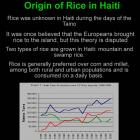ADVERTISEMENT
Sanitation
The Slaughterhouses of Croix-des-Bosales
Picture of a slaughterhouses in the metropolitan area of Port-auprince characterized by foul odors, scattering rubbish and pests of all kinds. These places for slaughter of "meat animals" operate outside of hygiene or safety standards.
La Saline slaughterhouse in Port-au-Prince is there since 1982. It is a blood-drenched patch of land near a site which was once used for trading slaves. Today, it is an open air abattoir that supplies meat to the city. Seeing animals being killed is one thing, but hearing the sound of animals about to be killed is quite different. If you haven't heard that before, it's quite cruel and pathetic. It happens every morning well before the dawn when people from different departments of the country come to slaughter their livestock, including goats, cattle, and pigs. For the local people who live here in the impoverished shanty houses, slaughtering animals is the only means to earn their daily breads. Every day, about 150 goats and 100 pigs are killed and the merchants pay a fee of 10 to 15 gourdes per animal to the slaughterhouse administration and the slaughterers, in turn, are rewarded with pieces of meat. The open killing ground smells of dead animals, smoke and burning trash. The stench produced from burning animal skins is very distinctive. Anyone buying animal elsewhere can get it killed here for 125 gourdes. He can pay a man less than a dollar to push the carcass in a wheel barrow to the other side of the market where the animal could be sold by weight. There is no proper infrastructure and the state authority, knowing the fact that this is one of the main sources of meat to the city, prefers to keep their eyes closed.
Pastor creates reusable diaper to help children in Haiti
Here is a simple but major invention that is supposed to improve sanitary living condition in Haiti. A Pastor creates reusable diaper to help children in Haiti.
Michael Wahl has a mission to ensure clean and healthy living for people living in the developing nations. When Pastor Michael Wahl witnessed how the infants and toddlers in the underdeveloped villages in Haiti openly poop in the house and how such waste is disposed unhygienically, he recognized some of the leading causes of uncontrolled spread of diseases like dysentery, cholera, typhus fever and typhoid. Earlier, he had worked on some projects to provide filtered water to some dry areas in Haiti. Now he realized that having clean water alone would not solve Haiti's problems with sanitation. He decided that something needed to be done to eliminate the open pooping of the infants in the house, He along with his wife Starla, created a reusable diaper called DriButts (the name of his NGO) in partnership with Slingshot(r) Product. These long lasting diapers include a super absorbent bamboo cloth liner with natural anti-microbial properties. During Michael's last visit to Haiti in the early September, he has distributed 720 reusable DriButts Diapers to 360 rural area families-- --- enough for an infant for two years. Wahl will return to Haiti in December with more diapers.
Red Cross to Educate Rural Haitians on Toilet Usage
The International Federation of the Red Cross (IFRC) wants to install toilets in Haitian communities across the country. Before this can be done, social and cultural values regarding bodily functions must be addressed.
The IFRC's research shows--in some communities--usage of open fields for elimination activities are considered acceptable.
The IFRC will develop a program to re-educate rural residents on the improved quality of life they will experience by using a modern commode.
The struggle to get water in a water fountain in Haiti - Life of a Restavek
I hope you never have to deal with something like this; however, this is something that many restavek in Haiti ha to deal with on a daily basis. Getting water in a fountain in Haiti while many others are after the same thing.
Let me tell you, getting water from a fountain in Haiti is worst than being involved in a boxing match. Everyone is fighting to get ahead not because they do not know any thing about order. They usually get involved in the fight because no one is certain as to how long the water will be flowing. It becomes a real struggle to be first. in addition, due to fight, most of the water is wasted.
Now just imagine for a moment you are a restavek and "madame is waiting for the water
The struggle to get water in a water fountain in Haiti
International Agencies attacking Cholera in Haiti on Several Fronts
UNICEF and non-government organizations have partnered with Haiti's Ministry of Public Health and Population to make emergency visits, utilizing mobile units, to any suspected cholera cases within two days.
In July 2014 UN Secretary General Ki-Moon, along with Prime Minister Lamothe, began a 5-year national sanitation initiative to build easy-to-construct, economical toilets.
Haiti has experienced a significant drop in cholera cases from 2011 to 2013 as a result of proactive measures, including immunization campaigns.

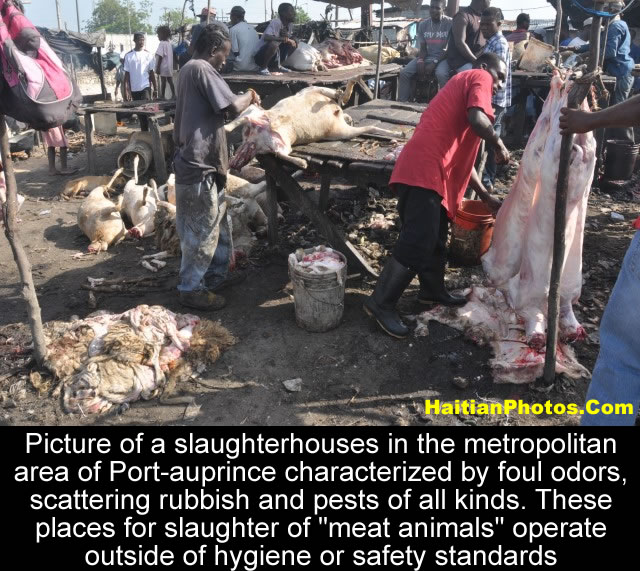
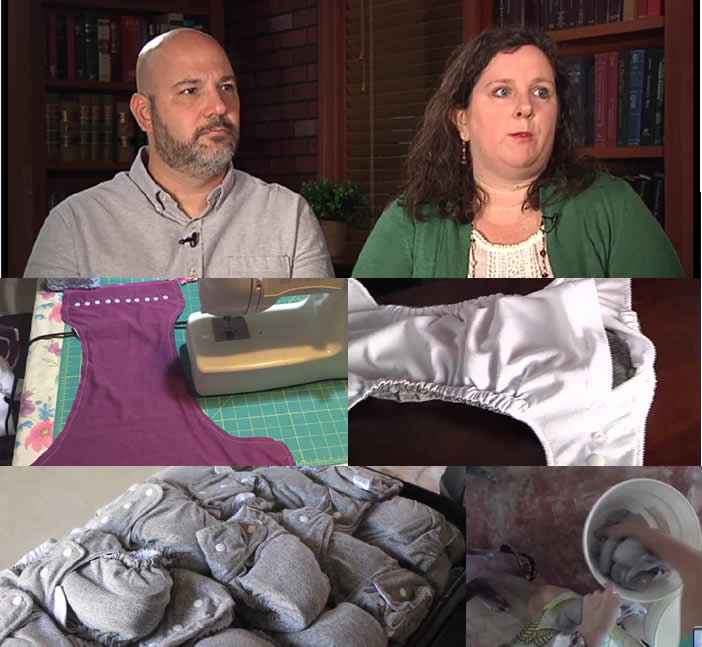
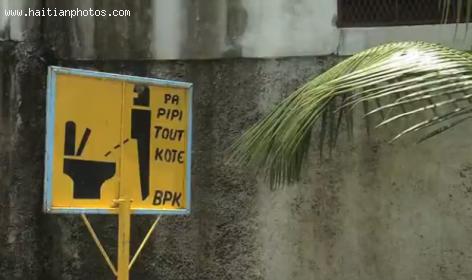
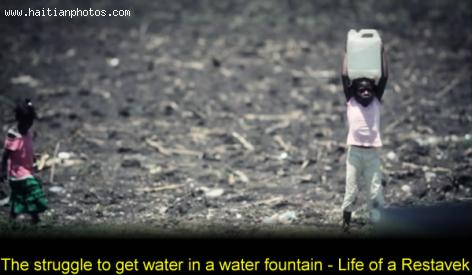
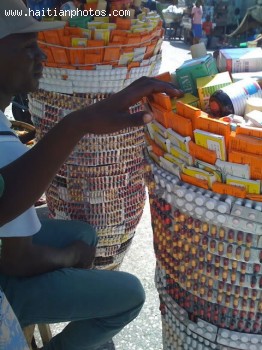
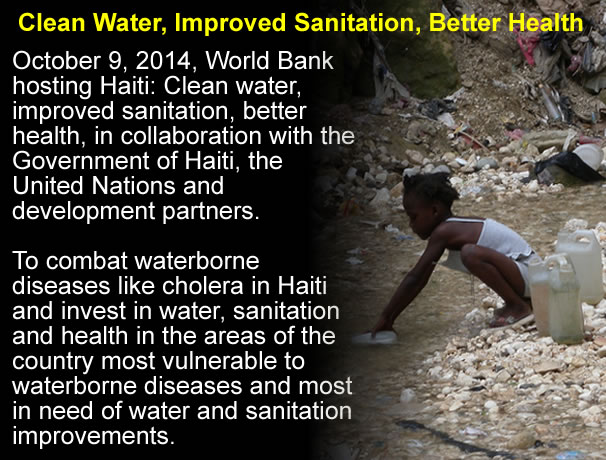
 Tourism In Haiti - Traditional Haitian Dance Performances
Tourism In Haiti - Traditional Haitian Dance Performances  Dr. Louis Noisin, Cap-Haitien
Dr. Louis Noisin, Cap-Haitien  Children of Haitian descent handcuffed, deported from the Bahamas
Children of Haitian descent handcuffed, deported from the Bahamas  Rafael L. Trujillo welcoming Paul Magloire in Santo Domingo
Rafael L. Trujillo welcoming Paul Magloire in Santo Domingo  Partial list of privileges enjoyed by Government officials in...
Partial list of privileges enjoyed by Government officials in...  Dr. Henri Ford, First Haitian Dean At University of Miami Med...
Dr. Henri Ford, First Haitian Dean At University of Miami Med...  Delimart Plaza, Delmas 32, Port-au-Prince, Haiti being looted
Delimart Plaza, Delmas 32, Port-au-Prince, Haiti being looted 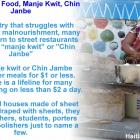 Haiti Street Food, manje kwit or Chin Janbe, for $1 or less
Haiti Street Food, manje kwit or Chin Janbe, for $1 or less 


